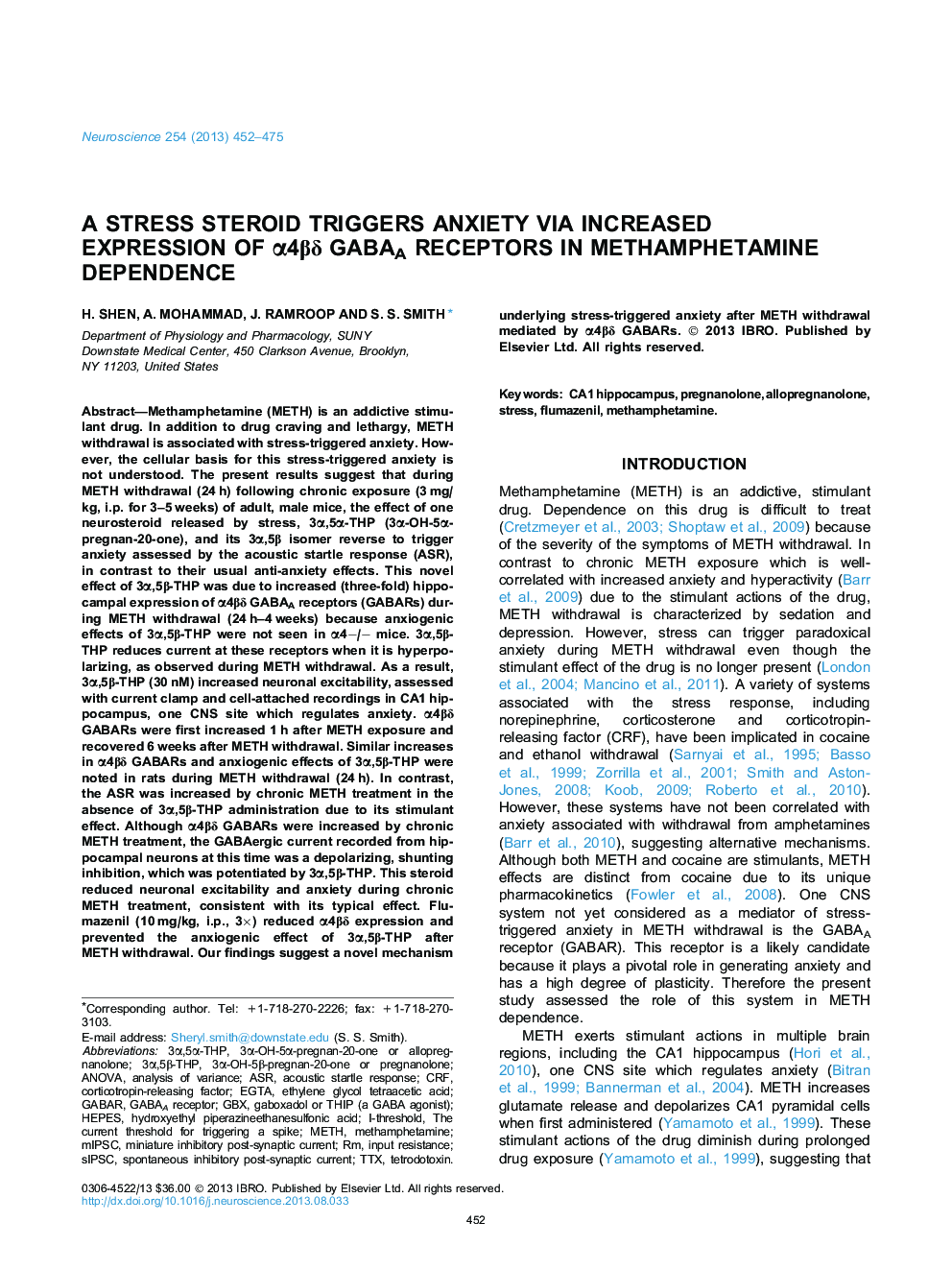| کد مقاله | کد نشریه | سال انتشار | مقاله انگلیسی | نسخه تمام متن |
|---|---|---|---|---|
| 6274387 | 1614822 | 2013 | 24 صفحه PDF | دانلود رایگان |
عنوان انگلیسی مقاله ISI
A stress steroid triggers anxiety via increased expression of α4βδ GABAA receptors in methamphetamine dependence
دانلود مقاله + سفارش ترجمه
دانلود مقاله ISI انگلیسی
رایگان برای ایرانیان
کلمات کلیدی
TTXPregnanoloneGbxmIPSCCA1 hippocampusCRFEGTA3α,5α-THPHEPESASRspontaneous inhibitory post-synaptic currentsIPSC - Şipscaethylene glycol tetraacetic acid - اتیلن گلیکول تتراستیک اسیدStress - استرس یا فشار روانیhydroxyethyl piperazineethanesulfonic acid - اسید هیدروکسی تیلپیرازین اتان سولفونیکallopregnanolone - الوپرگنانولونtetrodotoxin - تترو دوتوکسین analysis of variance - تحلیل واریانسANOVA - تحلیل واریانس Analysis of varianceminiature inhibitory post-synaptic current - جریان مینیاتوری پس از سیناپتی مهارکنندهcorticotropin-releasing factor - عامل تخریب کورتیکوتروپینFlumazenil - فلومازنیلMETH - متهMethamphetamine - متیل آمفتامینinput resistance - مقاومت ورودیacoustic startle response - واکنش هیجان آکوستیکGABAR - گابارGABAA receptor - گیرنده GABAA یا گیرنده گابا
موضوعات مرتبط
علوم زیستی و بیوفناوری
علم عصب شناسی
علوم اعصاب (عمومی)
پیش نمایش صفحه اول مقاله

چکیده انگلیسی
Methamphetamine (METH) is an addictive stimulant drug. In addition to drug craving and lethargy, METH withdrawal is associated with stress-triggered anxiety. However, the cellular basis for this stress-triggered anxiety is not understood. The present results suggest that during METH withdrawal (24 h) following chronic exposure (3 mg/kg, i.p. for 3-5 weeks) of adult, male mice, the effect of one neurosteroid released by stress, 3α,5α-THP (3α-OH-5α-pregnan-20-one), and its 3α,5β isomer reverse to trigger anxiety assessed by the acoustic startle response (ASR), in contrast to their usual anti-anxiety effects. This novel effect of 3α,5β-THP was due to increased (three-fold) hippocampal expression of α4βδ GABAA receptors (GABARs) during METH withdrawal (24 h-4 weeks) because anxiogenic effects of 3α,5β-THP were not seen in α4â/â mice. 3α,5β-THP reduces current at these receptors when it is hyperpolarizing, as observed during METH withdrawal. As a result, 3α,5β-THP (30 nM) increased neuronal excitability, assessed with current clamp and cell-attached recordings in CA1 hippocampus, one CNS site which regulates anxiety. α4βδ GABARs were first increased 1 h after METH exposure and recovered 6 weeks after METH withdrawal. Similar increases in α4βδ GABARs and anxiogenic effects of 3α,5β-THP were noted in rats during METH withdrawal (24 h). In contrast, the ASR was increased by chronic METH treatment in the absence of 3α,5β-THP administration due to its stimulant effect. Although α4βδ GABARs were increased by chronic METH treatment, the GABAergic current recorded from hippocampal neurons at this time was a depolarizing, shunting inhibition, which was potentiated by 3α,5β-THP. This steroid reduced neuronal excitability and anxiety during chronic METH treatment, consistent with its typical effect. Flumazenil (10 mg/kg, i.p., 3Ã) reduced α4βδ expression and prevented the anxiogenic effect of 3α,5β-THP after METH withdrawal. Our findings suggest a novel mechanism underlying stress-triggered anxiety after METH withdrawal mediated by α4βδ GABARs.
ناشر
Database: Elsevier - ScienceDirect (ساینس دایرکت)
Journal: Neuroscience - Volume 254, 19 December 2013, Pages 452-475
Journal: Neuroscience - Volume 254, 19 December 2013, Pages 452-475
نویسندگان
H. Shen, A. Mohammad, J. Ramroop, S.S. Smith,